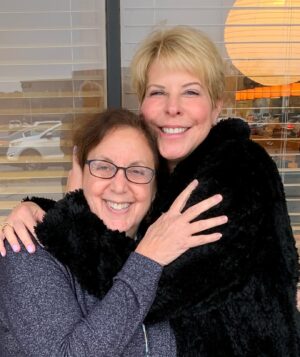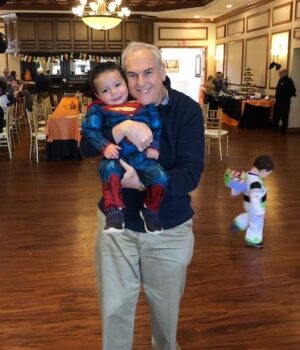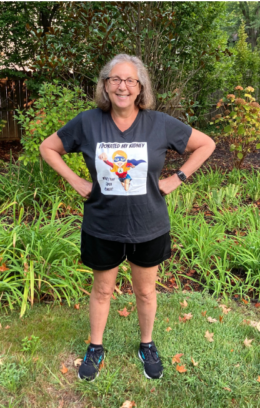Health + Medicine
Feature
A Perfect Match: Donating a Kidney to a Stranger
I first read about Debra Porter Gill’s need for a kidney in a December 2017 article in the Kansas City Jewish Chronicle. The headline on the front page blared, “Giving of oneself: Member of the Kansas City Jewish community in search of a new kidney.”
At the time, Gill was a stranger, but I felt drawn to her. She was 56, just five years younger than I was. She lives in Fort Lauderdale, Fla., but had grown up in a suburb of Kansas City, Mo., where I make my home.

to Debra Porter Gill after reading about her need for a living donor in a local Jewish newspaper in Kansas City. Courtesy of Martha Gershun.
Later, I learned of even more connections: Deb once belonged to Congregation Beth Torah in Overland Park, Kan., my Reform synagogue. She had sent two daughters to the same Hebrew school that my children had attended. She was a former family law attorney who had prosecuted child sex crimes in the same county where I had led a CASA (Court Appointed Special Advocates) organization helping abused and neglected children.
Deb had been diagnosed with insulin-dependent diabetes when she was a first-year law student. At the age of 27, she learned that she had chronic kidney disease. In 1999, Deb was one of six people to receive organs from a 42-year-old woman who died in a car accident. The transplant of a kidney and pancreas cured Deb’s diabetes and gave her full kidney function again.
But eventually, the donated kidney started to fail, and her doctors told Deb that waiting for another cadaveric kidney would take too long. She needed a living donor.
The article and the accompanying photo of Deb pulled me in. With her short blond hair and broad smile, Deb bore a striking resemblance to my cousin Ann, of blessed memory.
Ann had been one of my favorite people in the whole world. Smart, openhearted and always eager for a good story and a laugh, she was determined to stay positive despite the health issues caused by her polycystic kidney disease. In 2002, Ann received a kidney donation from a family friend—and she lived another nine years, long enough to see her daughters marry and the birth of four grandchildren. She was also able to celebrate the bar and bat mitzvahs of my son and daughter and to comfort me at my mother’s memorial service. When I read about Deb’s plight—and saw her smile—I knew I had to try to repay that gift.
Leading Resources
for Kidney Donation and Transplantation
National Kidney Foundation is among the oldest patient-focused nonprofits dealing with all aspects of kidney health. Its website features a primer on transplantation basics, including information on the United States’ national transplant list, the United Network for Organ Sharing; finding local transplant centers, which can have different criteria and costs; and whether patients should place themselves on waitlists at several centers.
National Kidney Registry facilitates the matching of living kidney donors with transplant patients nationwide. Its website includes information on donation “chains,” also called paired exchange or swapped donations, linking living donors incompatible with their intended recipients with other donors and recipients to find matches for all transplant patients in the chain.
Donate Life America is dedicated to public education about organ and tissue donations and the importance of registering to become a deceased organ donor. It also provides information on becoming a living donor.
Renewal provides financial and moral support to Jewish kidney patients and donors and their families throughout the transplantation process. It also works with local communities and Jewish organizations to help those in need of a transplant. For information on becoming a living donor through Renewal, go to renewal.org/becomeadonor.
Last year, 18,318 people donated organs in the United States. Two-thirds of those donors were deceased, and 5,730 donors were living. Most living donors are relatives, co-workers or friends of the patient. Fewer than 10 percent are “altruistic donors,” with no prior relationship to the recipient.
According to the National Kidney Foundation, kidneys from living donors have many advantages over those from cadaveric donors. They may be a better immunological match; reduce the time a patient is on the waiting list, so they embark on the rigorous surgery in better health; and reduce the time a kidney must be without blood prior to transplantation, thereby preserving more function in the organ.
Many “stranger donors,” another term for altruistic donors, are recruited through the media, as I was. Some find out about a patient in need from social media, a flyer or through a friend.
Community or faith-based organizations have stepped in to help locate altruistic donors. A model for those organizations within the Jewish community is Renewal, based in Brooklyn, N.Y. Since its founding in 2006, the nonprofit has matched hundreds of kidney patients with altruistic donors. Renewal helps Jewish patients work with community centers and synagogues to publicize the search and facilitates testing for potential donors.
READ MORE: Israel Ranks Near the Top in Live Organ Donations
“My family and I have been very grateful for everything Renewal has done to help in our search for a living donor,” said Dalia Harel, a Romanian-born retired medical researcher and grandmother who lives in Barrington, R.I. Harel, who has kidney failure, has been working with the organization since spring. “They are now organizing a large Zoom event to help me find a donor. They have already tested several potential donors on my behalf.” (For information on becoming a living donor for Harel, email R24289@renewal.org.)

Award-winning Jewish journalist Stewart Ain approached Renewal for help after he learned that a genetic condition had impacted the functioning of his kidneys. “Key to getting a kidney from a living donor is spreading the word that you need one,” said Ain, who lives in Commack, N.Y., and had written about Renewal in Jewish publications before discovering his own need. Renewal helped set up a Zoom event for him in September, where, he said, “we had more than 250 people tuned in from throughout the United States and Canada. Thanks to a Boca Raton synagogue, B’nai Torah Congregation, the local NBC television station in Palm Beach ran news stories about the Zoom program.
“I’m told a number of people on the Zoom call have indicated a willingness to be tested to see if they are eligible to become my living donor,” Ain reported. “In the meantime, I am still trying to spread the word.” (For information on becoming a donor for Ain, contact Rabbi Josh Sturm at
jsturm@renewal.org.)
Prior to making the decision to donate my kidney, I spoke to my good friend Dr. John D. Lantos, a pediatrician and bioethicist who is the director of the Bioethics Center at Children’s Mercy Hospital in Kansas City. In medical ethics and health law, he said, there is a long-running debate about living donation since it calls for doctors to intentionally cause harm to one person—the donor—in order to benefit another. It would seem to violate one of the most fundamental precepts in medical ethics: “First, do no harm.”
Living organ donation has evolved since the first successful living kidney transplant between identical twins in Boston in 1954, he explained. At that time, the American medical establishment concluded that since a twin had an interest in the well-being of a sibling, the physical risk of donation was balanced by the psychological benefit of saving a loved one.
The development of tissue typing and matching, and drugs that could safely suppress the immune system to prevent the rejection of transplanted organs, allowed the pool of potential donors to widen from relatives to friends and colleagues, even strangers. But questions persisted about the ethics of living organ donation. Close relatives might benefit psychologically from saving a loved one, but does that apply to friends? Or to strangers like me?
The medical community has worked hard to define that line, Dr. Lantos explained, allowing people who find great meaning in becoming organ donors to consent to transplantation, while implementing psychological screening to weed out others who might feel coerced or be motivated by self-destructive tendencies.
The more I learned about living organ donation, the more it felt like it was my turn to fulfill the Jewish mitzvah of pikuach nefesh—to save a life.
The timing seemed propitious. I had retired in April 2017 after a long career in corporate and nonprofit management. My husband was well established as the executive director and CEO of Jewish Family Services of Greater Kansas City, the agency he had been running for more than a decade. Both of our children were living their own lives far from home. Everyone I loved was settled and stable. My time was my own.
Learn About Organ Donation With Hadassah
Join Hadassah Greater Kansas City on Zoom on Saturday, November 20, at 7:30 p.m. CT for their fourth annual Touch of Red Gala. This year’s theme is Celebrate Life!, focusing on the importance of organ donation. Martha Gershun and Debra Porter Gill as well as Katie Edelstein and Belle Simon will share their experiences as living donor-transplant recipient pairs. Other speakers will discuss transplantation at the Hadassah Medical Organization in Israel. The event is free and open to all. Register here.
At the end of the Jewish Chronicle article, there was a phone number for the Transplant Center at the Mayo Clinic in Rochester, Minn., where Deb was enrolled. One of more than 250 transplant centers in the United States, the Mayo Clinic performs more living kidney transplants than any other hospital in the country.
I called, and the receptionist directed me to fill out an online questionnaire. Two weeks later, I received a call from Lisa, one of the clinic’s Nurse Transplant Coordinators. My blood type, B positive, was the same as Deb’s, she told me, elevating the odds I might match as a potential donor. Subsequent blood tests revealed that despite the 1 in 100,000 odds that two biologically unrelated people will be compatible for organ transplantation, Deb and I were a perfect match.
Lisa explained that HIPAA privacy rules precluded the clinic from revealing to a patient the identity of a potential donor or sharing a patient’s contact information. I could decide to tell Deb that we were a match or remain anonymous.
Keeping this a secret was not in my nature. I found Deb on Facebook, sent a message and held my breath. Would she think I was some stalker? Would she be an emotional mess?
Deb answered the next day: “I read your message and it literally took my breath away. I had to take a little time before responding because I couldn’t find the words to express my gratitude…. Your incredible offer to donate one of your kidneys to me, or to anyone you don’t know, is beyond generous.”
Her reaction reassured me, and in a fortuitous coincidence, Deb was en route to spend a week with her family in Kansas City just as I was reaching out. I still didn’t know if I would be cleared to donate, but this seemed like our best chance to meet in person. We agreed to have lunch.
Before our lunch, I was as nervous as I would be for a first date. What are the protocols for meeting the woman whose life you are trying to save?
I needn’t have worried. Deb and I connected right away. I loved that she wasn’t maudlin about her health and that she was appropriately grateful, but never over the top with her thanks. Deb and I had many things in common: We both liked to write, were active in progressive politics and had spent our careers helping children facing adversity. As we stumbled on new bits of synchronicity, we became increasingly convinced that our match was bashert.
Two months of rigorous medical and psychological testing followed, all paid for by Deb’s insurance. Finally, I got the call we were waiting for: The transplant team agreed I was healthy and sane enough to donate my kidney.

to stay in shape.
The next phase of the journey involved some hiccups. Our first direct transplant attempt was cancelled the night before our scheduled surgery, when the doctors became concerned that Deb was too sick for the procedure.
After intensive treatment, she recovered. On September 28, 2018, nine months after I first read about her in the Jewish Chronicle, Deb and I found ourselves in adjoining beds at the Mayo Clinic, being prepped for surgery. Before the morning was over, my left kidney was surgically removed and transplanted into Deb.
It has now been more than three years since our surgeries, and both Deb, now 60, and I, at 65, continue to do well. She has taken my kidney on amazing adventures—including ziplining in Honduras. I have returned to my life as a nonprofit consultant and writer. I have had no adverse health effects from donating a kidney. Through the pandemic, I’ve been walking five miles a day and am in better shape than I was before the transplant.
Deb and I stay in touch by text, phone calls and Zoom. And we try to get together whenever she travels to Kansas City to see her family.
Every day in America, 13 people die waiting for a kidney. Often their best hope—their only hope—is to find a living donor. I will always be grateful I was able to perform this deeply meaningful, scientifically miraculous mitzvah. If I could, I’d do it again.
Read More: The “Hadassah Kidney”
Martha Gershun is a nonprofit consultant, writer and community volunteer and the co-author of Kidney to Share (Cornell Press) with Dr. John D. Lantos, director of the Bioethics Center at Children’s Mercy Hospital in Kansas City, Mo.








 Facebook
Facebook Instagram
Instagram Twitter
Twitter
Ron Wolfson says
Fantastic story of a wonderful mitzvah! So proud of Martha!
Beth Berkowitz says
How would I get a living donor for my husband. I have exhausted all avenues. I’m looking for a hero to save my hero. He has gone thru every test. He is in stage 4 and just recently put on a list. Unfortunately waiting for a living donor will take 5 years. Could I get a mitzvah. I have no pride in asking hoping all my prayers will be answered by someone. Could you help
Andrea Kaiser says
Dear Beth,
I am trying to convince Hadassah to work with Kidneysforcommunities.org to help members get the word out about needing a living kidney. My Son successfully received a living kidney three years ago but Hadassah did not help at that time. I want to change that disappointment I faced. Let’s work together to achieve a mitzvah for your husband and many others.